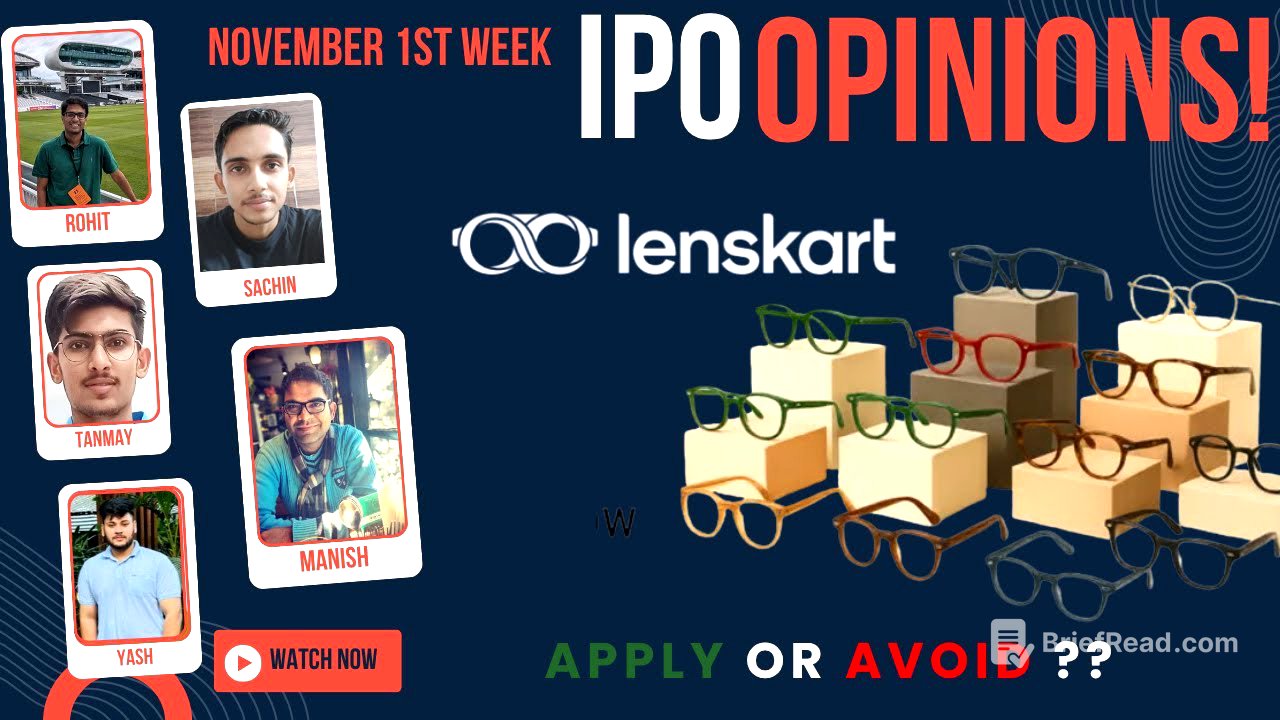TLDR;
This YouTube video by Sunday Investing provides a comprehensive analysis of the Lenskart IPO. The discussion covers Lenskart's business model, market position, financial performance, valuation, and potential risks. The speakers share their perspectives on whether to apply for the IPO, primarily focusing on short-term gains due to the expected frenzy, while also cautioning about long-term risks associated with new-age companies and the importance of growth.
- Lenskart's business model, market position, and competition
- Financial performance, including revenue, EBITDA, and PAT
- IPO details, including size, fresh issue, and OFS
- Valuation metrics, comparing Lenskart to other consumer tech companies
- Potential risks, including growth slowdown and reliance on acquisitions
- Perspectives on applying for the IPO, focusing on short-term gains
Opening Remarks [0:00]
The host welcomes viewers to the primary market chatter by Sunday Investing, focusing on IPO reviews from a fundamental perspective. They mention that they have been doing this for the last 18 months, providing balanced perspectives on IPOs and sharing their own plans regarding applications. This episode is dedicated solely to Lenskart due to the significant hype surrounding its IPO, both positive and negative. The host clarifies that they are not SEBI registered research analysts and that their opinions are not qualified advice, urging viewers to conduct their own due diligence. They also address a language setting issue on YouTube, advising viewers to switch back to English if the audio defaults to Hindi.
Lenskart Solutions (Mainboard) [3:19]
Lenskart, established in 2008, is a technology-focused eyewear company involved in design, manufacturing, branding, and retail of eyeglasses, sunglasses, contact lenses, and accessories. It is a major player in the Indian market, known for pioneering online specs sales and having an omni-channel presence with both online and retail stores. The IPO is worth ₹7,278 crore, including a fresh issue of ₹250 crore. Concerns have been raised about the company's valuation, with metrics like 10 times sales and 230 times earnings. Lenskart is described as Asia's and India's largest organized eyewear retail chain, with a mission of "eyewear for all," capitalizing on the increasing myopia rates due to digital penetration and screen time.
Lenskart has integrated operations across designing, manufacturing, and retailing eyewear products, offering affordable and quality options. Its business model includes online (with 10 crore downloads) and retail channels (2,806 stores globally, including 2,137 in India and 669 overseas). The company operates various store models, including company-owned, franchise-owned, and key-operated franchises, with a focus on company-owned stores for better control over product quality and consumer experience. Lenskart has five facilities, including one in Gurugram, one in Bhiwadi, a JV in China, and facilities in the UAE and Singapore. The Bhiwadi facility is among the largest globally. The company has 23 sub-brands, including Lenskart and Owndays, with brands like John Jacobs and Vincent Chase.
The Indian eyewear market is largely unorganized, with only about 20-40% being organized. Lenskart faces limited competition in the organized retail chain segment, with Luxottica being a global player but not directly comparable due to its premium pricing. Titan Eyeplus is a competitor with around 700-750 stores, but Lenskart has more than 2,000 stores.
Addressing concerns about promoter P.J. Bunal buying shares at ₹52 and selling at ₹500, it's explained that this is a common practice to allow promoters to increase their stake closer to an IPO. Investors permitted him to claw back some shares to increase his promoter shareholding.
The criticism around Lenskart's valuation is unwarranted, and focusing solely on the P/E multiple is misleading. The company's EBITDA multiple is reasonable compared to other consumer brands and internet companies. Lenskart is a high-growth global consumer brand, which is rare for Indian companies, and such companies typically command high valuations. Maintaining a growth rate of 25% or more is crucial for sustaining market interest. It is important to consider whether Lenskart is a technology company, given P.J. Bunal's focus on technology and potential for innovations like smart glasses.
The IPO aims to raise ₹7,278 crore, with ₹2,150 crore as a fresh issue and ₹5,128 crore as an offer for sale (OFS). The funds will be used for opening new company-owned stores, lease rentals, technology and cloud infrastructure, brand and marketing, acquisitions, and general corporate purposes.
In FY23, Lenskart had a revenue of ₹3,788 crore and an EBITDA of ₹260 crore, with a net loss of ₹64 crore. In FY24, revenue increased to ₹5,428 crore, with an EBITDA of ₹672 crore and a loss of ₹402 crore. In FY25, revenue reached ₹6,533 crore, with an EBITDA of ₹971 crore and a PAT of ₹297 crore. Q1 revenue was ₹1,895 crore, with an EBITDA of ₹336 crore and a PAT of ₹61 crore. The company generated ₹1,123 crore in cash from operating activities in FY22.
The discussion addresses the common practice of promoters being rewarded with equity after achieving certain milestones, justifying P.J. Bunal's increased stake. The valuation is analyzed by comparing Lenskart to other consumer tech companies like Nykaa, Zomato, and Trent, using metrics like FY28 EBITDA multiples. Lenskart is considered the cheapest consumer tech company in the Indian stock market, with the potential to become a global company with high margins.
Conservative estimates suggest a market cap to sales ratio of 6.5 times and an EBITDA multiple of 35 times for FY27. The pricing is considered reasonable, with a potential 20% upside. The company's growth beyond 20% is crucial for maintaining rich valuations.
The speakers express their intent to apply for the IPO, aiming for listing gains and short-term profits, with plans to exit after around 25% gains. They highlight the importance of considering both positive and negative perspectives and expanding one's mindset before making investment decisions.
Capacity utilization was at 48% in FY25 and 55.5% in Q1, with projections of 60% for FY26. The company is launching digital glasses and audio products, entering new markets aggressively.
Closing Remarks [1:10:22]
The marketing approach of Lenskart has been criticized for shifting from being a spectacles company to a consumer tech company. The accounting adjustments for FVTPL have also raised concerns, although the company has consistently generated income from mutual funds and fixed deposits. The integration of Dealskart is seen as a positive move, supporting future growth projections.
The speakers reiterate their intent to apply for the IPO for short-term gains, acknowledging the hype surrounding the issue. They caution about the risk of growth slowing down in new-age companies and the importance of monitoring growth numbers. The anchor book composition is discussed, with varying interpretations of the .1% allocation to each anchor investor.
The speakers emphasize the importance of doing one's own due diligence and making informed decisions. They mention the potential risks associated with LASIK and the need to consider long-term growth prospects. The expected subscription levels for QIB, HNI, and retail investors are discussed, with a focus on participating in the issue for short-term gains.
The promoter will remain in place post-IPO, with shares locked in for a certain period. The conflicting opinions on the promoter's motivations for buying shares are acknowledged, with both genuine and logical arguments presented.
The speakers conclude by reiterating that their opinions may not be accurate and that viewers should conduct their own research. They announce an upcoming discussion on another potentially controversial company, highlighting the importance of analyzing financials and making informed decisions.









